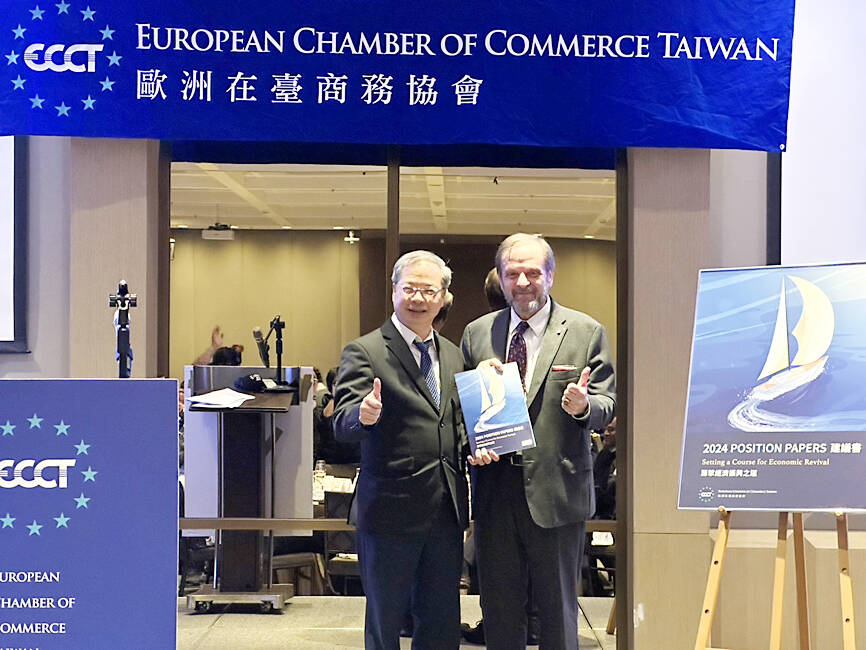The European Chamber of Commerce Taiwan (ECCT) released its annual position papers on Thursday, in which it proposed recommendations mainly in the areas of energy, talent and internationalization to help boost the nation’s business environment.
ECCT chairman Giuseppe Izzo said this year’s report, titled Setting a Course for Economic Revival, included submissions from 25 ECCT committees and raised 175 issues, including 67 not previously included.
“Taiwan’s economy is facing headwinds and choppy seas and the outlook for 2024 is uncertain,” Izzo said, stressing that due to uncertainties Taiwan needs to chart a clear course to help it “avoid the worst conditions that are beyond its control” through removing regulatory constraints, revising unsuitable laws and regulations and streamlining administrative procedures.

Photo: CNA
Energy, talent and internationalization are the three main issues raised in the paper, the chamber said.
Izzo called for the “prioritization of renewable energy capacity expansion,” especially in the field of offshore wind power, saying official targets have not been met due to “local content requirements, regulatory red tape and difficulties in financing.”
The chamber recommends revising rules to spur local supply chain competitiveness, streamlining the permit process and liberalizing the energy market, he said.
Regarding energy, the ECCT called on the government to support the country’s transition to transport powered by electricity, particularly by removing regulations that are slowing the installation of charging infrastructure.
Regarding expanding Taiwan’s talent pool, Izzo said Taiwan continues to face shortages of skilled and semi-skilled domestic and foreign workers due to shifting demographics, and overly restrictive labor laws and visa and work permit rules.
Family-friendly policies, for example, should be further promoted, the chamber said.
“Offering young parents more flexible options for remote work, allowing employees to choose to work from home rather than taking unpaid parental leave, and building or subsidizing the building of more childcare facilities” are some of the policy changes that could be made to improve the situation, it said.
Regarding internationalization, the chamber raised the issues of adopting international standards, enhancing digitization and promoting bilingualism.
Given that policy, laws, regulations and other public announcements are mainly bilingual, the ECCT said that the government should now pay attention to the lack of English proficiency in those working in government ministries.
A chamber education committee representative called for English proficiency as a criterion for promotion and for the inclusion of more new bilingual residents.
The ECCT publishes a series of position papers annually, which address chamber member companies’ concerns regarding Taiwan’s business environment and provide practical recommendations for solving regulatory issues, the organization’s Web site says.

SEEKING CLARITY: Washington should not adopt measures that create uncertainties for ‘existing semiconductor investments,’ TSMC said referring to its US$165 billion in the US Taiwan Semiconductor Manufacturing Co (TSMC, 台積電) told the US that any future tariffs on Taiwanese semiconductors could reduce demand for chips and derail its pledge to increase its investment in Arizona. “New import restrictions could jeopardize current US leadership in the competitive technology industry and create uncertainties for many committed semiconductor capital projects in the US, including TSMC Arizona’s significant investment plan in Phoenix,” the chipmaker wrote in a letter to the US Department of Commerce. TSMC issued the warning in response to a solicitation for comments by the department on a possible tariff on semiconductor imports by US President Donald Trump’s

‘FAILED EXPORT CONTROLS’: Jensen Huang said that Washington should maximize the speed of AI diffusion, because not doing so would give competitors an advantage Nvidia Corp cofounder and chief executive officer Jensen Huang (黃仁勳) yesterday criticized the US government’s restrictions on exports of artificial intelligence (AI) chips to China, saying that the policy was a failure and would only spur China to accelerate AI development. The export controls gave China the spirit, motivation and government support to accelerate AI development, Huang told reporters at the Computex trade show in Taipei. The competition in China is already intense, given its strong software capabilities, extensive technology ecosystems and work efficiency, he said. “All in all, the export controls were a failure. The facts would suggest it,” he said. “The US

The government has launched a three-pronged strategy to attract local and international talent, aiming to position Taiwan as a new global hub following Nvidia Corp’s announcement that it has chosen Taipei as the site of its Taiwan headquarters. Nvidia cofounder and CEO Jensen Huang (黃仁勳) on Monday last week announced during his keynote speech at the Computex trade show in Taipei that the Nvidia Constellation, the company’s planned Taiwan headquarters, would be located in the Beitou-Shilin Technology Park (北投士林科技園區) in Taipei. Huang’s decision to establish a base in Taiwan is “primarily due to Taiwan’s talent pool and its strength in the semiconductor

French President Emmanuel Macron has expressed gratitude to Hon Hai Precision Industry Co (鴻海精密) for its plan to invest approximately 250 million euros (US$278 million) in a joint venture in France focused on the semiconductor and space industries. On his official X account on Tuesday, Macron thanked Hon Hai, also known globally as Foxconn Technology Group (富士康科技集團), for its investment projects announced at Choose France, a flagship economic summit held on Monday to attract foreign investment. In the post, Macron included a GIF displaying the national flag of the Republic of China (Taiwan), as he did for other foreign investors, including China-based